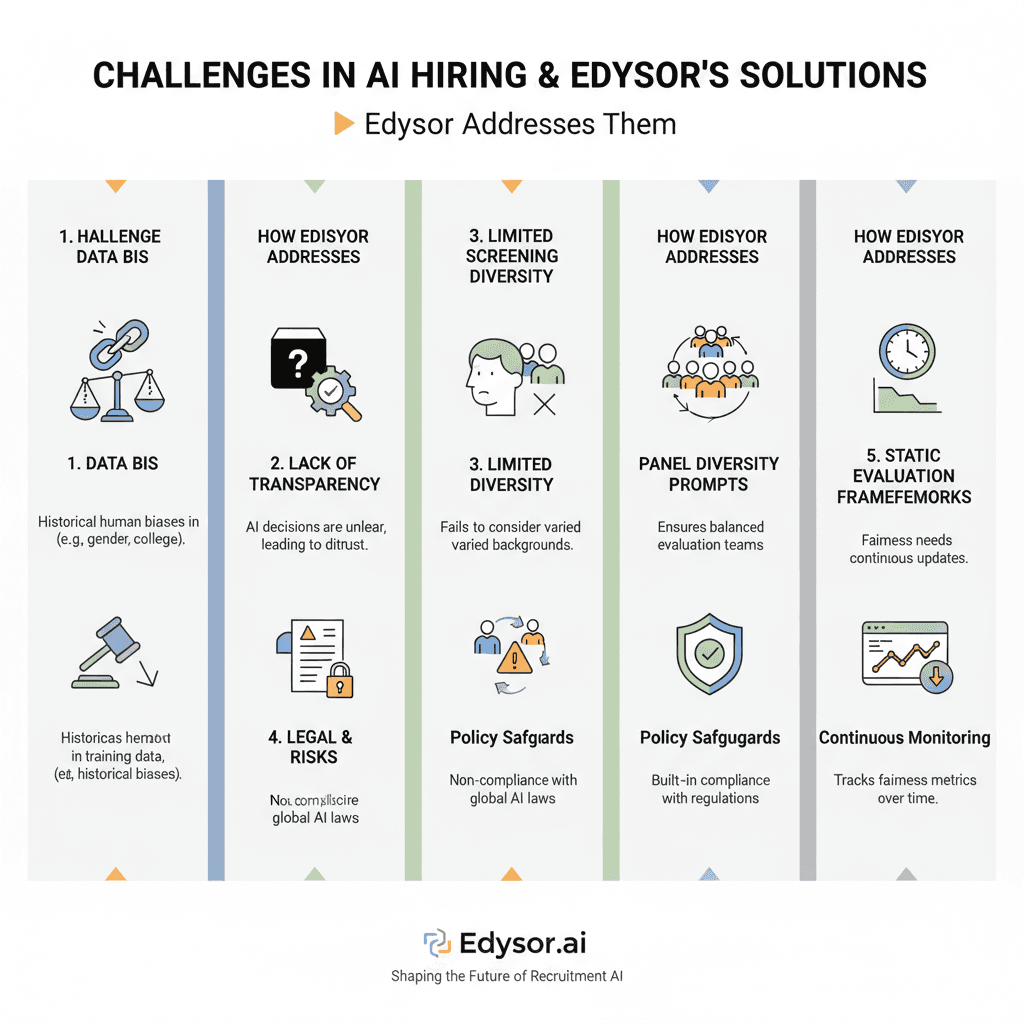
8 Nov 2025
Artificial Intelligence (AI) technology has revolutionized the entire process of hiring, talent management and recruitment. AI systems today control the selection process through resume screening and video interview stages which determine candidate suitability for job openings. AI hiring systems need to handle their power with care because they must prevent discrimination during the recruitment process.
This article investigates the worldwide necessity of AI hiring fairness and its specific importance for Indian organizations while presenting Edysor solutions and practical tools for building fair workplaces through Recruitment AI.
The article presents a detailed analysis of recruitment challenges, benefits, Edysor solutions and practical methods for Bias Mitigation & Fairness in AI Hiring including anonymized screening, bias detection, fairness metrics and explainability. The content includes interactive elements such as quizzes, FAQs and Q&A sections to make the information accessible to educational institutions and business organizations.
Research conducted worldwide demonstrates that AI systems maintain existing social inequalities instead of working to eliminate them. The Amazon AI recruitment tool demonstrated how past hiring data biases were embedded into its system which resulted in penalizing female candidates through their resumes.
Global corporations face dual pressures to prove their commitment to diversity, equity and inclusion because they must both follow legal requirements and protect their corporate reputation.
The competition among millions of Indian graduates each year makes AI hiring fairness essential for this country. The Indian workforce receives 1.2 million new engineers and professionals through annual additions.
Indian universities together with companies and job platforms must establish Bias Mitigation & Fairness in AI Hiring as both an ethical and economic necessity.
The implementation of Recruitment AI systems encounters multiple operational obstacles despite their technological advancements. The following section examines all current obstacles that Edysor.ai handles through its solutions.
The hiring data collected in the past contains human prejudices which stem from gender, college standing and speech patterns. The absence of control measures enables AI systems to strengthen existing biases.
Edysor’s solution: The bias detection system at Edysor uses fairness metrics to prevent historical biases from affecting future hiring decisions.
Black-box AI decisions create confusion among candidates because they cannot understand the selection criteria.
Edysor’s solution: The explainable AI functionality at Edysor provides universities and companies with insights about candidate selection reasons.
The evaluation process of many AI systems neglects to incorporate diverse candidate backgrounds that include different regions and languages.
Edysor’s solution: The system at Edysor implements panel diversity prompts which help assessors provide balanced evaluations.
AI systems must demonstrate accountability according to new worldwide regulations which have been established. The EU's AI Act together with U.S. Edysor’s solution: Equal Employment Opportunity laws demonstrate the need for AI system accountability.
The built-in policy safeguards at Edysor maintain Recruitment AI systems in compliance with worldwide regulatory requirements.
Hiring ecosystems undergo continuous changes. A single fairness assessment during the initial setup does not provide sufficient protection.
Edysor’s solution: The continuous monitoring dashboards at Edysor enable businesses to track fairness metrics throughout different periods of time.
The implementation of Recruitment AI for fair hiring practices delivers concrete advantages to organizations.
Edysor.ai has created complete tools which address the fairness problems that occur during the hiring process. The Recruitment AI suite from Edysor.ai consists of three main components.
The system performs automated scans to detect instances where hiring models generate different scores for candidates based on their demographic characteristics.
The system integrates quantitative fairness metrics (demographic parity and equal opportunity) into dashboard interfaces which HR teams can track.
The system conceals candidate identification information including names, photos, age and gender details to enable evaluation based on qualifications and achievements.
The system generates prompts for HR departments to build evaluator panels with members who represent different gender profiles, regional origins and professional backgrounds.
The Recruitment AI system generates understandable AI results which explain the reasons behind candidate ranking positions. The system establishes trust between students, universities and businesses through its explainable AI outputs.
The system includes features that meet GDPR, EEOC standards and the requirements of India's Digital Data Protection Act.
The recruitment dashboards run continuous bias metric checks which send notifications when the detected disparities surpass established limits.
The Indian university implements Edysor's Recruitment AI system to handle its campus recruitment process.
Students and recruiters develop trust in the process through a transparent placement season.
Edysor focuses on shipping fair-screening tooling and dashboards to monitor bias metrics. These aren’t just features—they’re structural changes shaping the future of recruitment:
Organizations experience ongoing evaluation from regulatory bodies, workplace personnel and market consumers regarding their hiring methods' fairness standards.
Universities serve as connectors between students and employers while their recruitment fairness determines how employers view them.
The main recipients of Bias Mitigation & Fairness in AI Hiring benefits are students who apply for positions.
Q1: What is the greatest concern about AI hiring?
A1: The worst case scenario is simply that we encode humanity's existing biases into the automated systems, and in doing so this only creates more unfairness at scale.
Q2: Is it possible to make bias in AI hiring disappear?
A2: Not quite, continuous monitoring and fairness metrics can reduce it significantly.
Q3: What is the importance of explainable AI in hiring?
A3: It fosters candidate trust and regulatory compliance by providing clear explanations for AI-powered decisions.
Q4: Explain how Edysor’s Recruitment AI is beneficial for businesses.
A4: Fair and inclusive recruiting can be achieved by companies using tools such as anonymized screening, panel diversity prompts and dashboards.
1. Which metric is used to measure fairness in hiring AI?
a) Demographic Parity
b) Return on Investment
c) Learning Rate
Answer: a) Demographic Parity
2. What feature ensures resumes aren’t filtered using names or gender?
a) Data Bias Modeling
b) Anonymized Screening
c) Policy Safeguards
Answer: b) Anonymized Screening
3. What does Edysor’s continuous monitoring do?
a) Tracks stock market trends
b) Monitors bias over time
c) Enhances cultural interview skills
Answer: b) Monitors bias over time
AI hiring systems with bias mitigation and fairness functions now represent the essential base for business success, university enrollment and student achievement. The growing dependence on automated hiring systems requires businesses to establish transparent and accountable recruitment AI systems which prevent the transfer of existing biases into modern systems. Edysor’s Recruitment AI provides a transformative solution through its combination of bias detection, fairness metrics, anonymized screening, panel diversity prompts, explainability, policy safeguards and continuous monitoring features which maintain human values in technology.
The adoption of strong fairness strategies by India's large annual graduate workforce and global businesses seeking diverse teams leads to improved employer reputation, regulatory compliance, enhanced innovation and stakeholder trust.
Q: Who benefits the most from Edysor’s Recruitment AI, students, universities, or companies?
A: All three. Students win by getting fairness, universities guarantee equity in placement and companies enhance their ethical hiring.
Q: What is the frequency at which you should test for AI fairness?
A: Real-time monitoring will always be the gold standard, but at the very least, a quarterly audit to make sure one is in compliance.
Q: What about India isn’t it important for us to adopt?
A: Yes, in India also getting a fair chance is equally critical given the large number of job seekers and to tap into we need everyone.
Q: Does reducing bias slow hiring down?
A: No. Edysor’s Recruitment AI automates fairness, without losing efficiency.
By Gunjan Pancholi, Co-Founder & AI Solutions Architect, Edysor.ai | Driving Innovation in Custom GPTs, Voice Agents & Social Bots | Product Strategist | Tech Visionary | Leading R&D in EdTech & Study Abroad Automation | Growth-Focused
LinkedIn Profile: https://in.linkedin.com/in/gunjan-pancholi-216171263
Resources
Others
All rights reserved. Powered by Edysor
